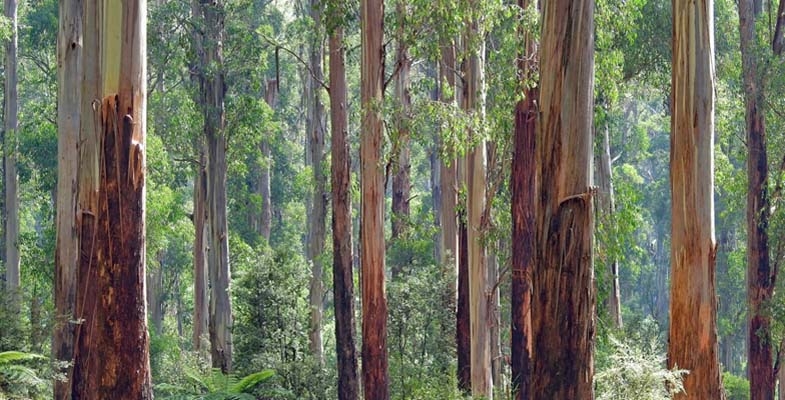NSW has two million hectares of public native forests along the coast. They are home to diverse wildlife and myriad forest ecosystems. Currently the primary use of these forests is timber production. Native forest logging takes place under regional forest agreements that are supposed to provide for ‘sustainable forest management’. Yet there are numerous examples of scarce hollow bearing trees and trees that provide koala habitat being felled. Forestry Corporation has been fined by the EPA multiple times for breaching forestry rules.
The loss of large areas of forest during the Black Summer bushfires has made the habitat provided by these forests all the more critical. Several species have been added to the threatened list since the fires, such as the koala, gang-gang cockatoo and greater glider.
These forests are also important for filtering water, slowing floodwater flows and storage of carbon. Forests can also provide opportunities for tourism and recreation both active and passive, such as bike riding, sightseeing and bushwalking.
Petition signed by over 21,000
In an attempt to end native forest logging a petition was launched by NSW Young Greens Indigenous Officer Takesa Frank and the Nature Conservation Council. It received more than 21,000 signatures which has forced parliament to respond.
The petition called for the NSW government to:
- develop a plan to transition native forest logging to 100% sustainable plantation forestry by 2024
- in the interim place a moratorium on logging until the regulatory framework is applied in line with the Natural Resources Commission recommendations
- immediately place high conservation value forests into the National Park estate
- immediately ban the use of native forest materials as biomass
The responsible Minister for Agriculture, the Hon Dugald Saunders, was dismissive. He claimed that the views of the 21,000 people who signed the petition are insignificant.
Some of the government’s arguments made in their response can be refuted, for example:
- Cutting down native forests is environmentally sustainable
Response: Current practices are destroying biodiversity such as loss of koala habitat and increasing the number of threatened species.
- Only a minority of people care about the issue
Response: A huge survey commissioned by the forestry industry in 2016 found that 70% of people in cities and 65% in regional areas are against native forest logging.
- Native forest logging is financially viable
Response: This industry is barely making a profit.
- Logging native forests will help overcome the shortage of construction timber
Response: The timber used by the construction industry is almost exclusively plantation pine. Meanwhile our native forests are chipped and shipped overseas for paper products.
- It is better to use local timbers than those from overseas
Response: Illegally logged timber is already banned from being imported to Australia, and many imported products meet the Forestry Stewardship Council (FSC) certification, a standard that NSW Forestry Corporation does not meet, because of its unacceptable impacts on biodiversity.
- Logging native forests employs 20,000 people
Response: The number of jobs is a twentieth of the total the minister claims, at 1,000 jobs across the whole of NSW. There are 20,000 jobs in the sustainable plantation industry
Cost-benefit analysis of the industry In the South Coast
A study by Frontier Economics found that there is economic benefit from ceasing native forest harvesting in the Southern and Eden forest regions of NSW. The economic analysis measures the stream of costs and benefits over a 30 year period to 2051. The net result was a gain of $62 million if the state-owned native forests are no longer harvested.
The report took a simplified approach by restricting the analysis to compare the existing operations with the creation of a mountain bike park. This covered:
- costs: loss of value of harvested wood and construction and maintenance of mountain bike recreation area
- benefits: avoided costs of harvesting wood and processing, value of carbon credits, economic value of recreation
More complex factors were not included such as the value of wildlife saved and visitor tourism apart from mountain biking.
In conclusion, Frontier Economics found that Forestry Corporation NSW’s hardwood business made a normalised profit of $0.4 million in the financial year 2020, and an average normalised profit of $2.3 million over the five years to 2020. This is a very small profit and significantly smaller than the $64 million five year average over the same period earned by their softwood plantation business.
This poor return should be taken in context with the economic benefit from ceasing native forest harvesting and obtaining environmental and recreational services from the forest. This, along with the environmental concerns, has led Victoria and WA to decide to cease logging their native forests and to provide significant financial support to the industry to transition to a greater focus on plantation operations and other sectors of the economy. Now it’s time for NSW to also make the commitment.
Private land forestry
Currently, logging operations on private property in many areas have dual oversight from both the state government and local councils. Local councils have the ability to limit and control logging operations within their region. Just this month the National Party tried to revive the ‘koala wars’ by introducing a bill before the NSW parliament to remove this control. Fortunately several Liberal MPs threatened to vote against the bill and it has been withdrawn.

